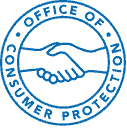Welcome to the Office of Consumer Protection
The Office of Consumer Protection (OCP) helps protect Montgomery County consumers by investigating and resolving consumer complaints, licensing and registering businesses, and engaging in consumer education and outreach. Our office was established in 1971 and we are proud to have earned national recognition. Learn more about OCP and how our team can be of service to you.
- File a consumer complaint Search our merchant complaint records. File a merchant complaint.

- License and register your business Apply for licenses and registrations. Learn about regulations.


